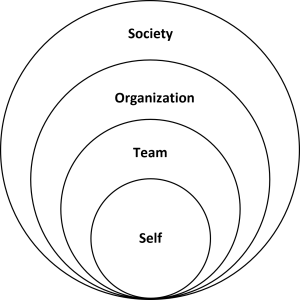Leadership Domains of Influence
Leadership skills are developed and applied in a variety of contexts. One way to represent this is through “leadership domains of influence” as depicted in Figure 1. The leadership domains of influence increase in scale and scope from self, through team, through organization, to society. Leadership Influence grows as an individual develops skills through these domains of influence.

Leadership Domains of Influence (Jamieson & Donald, 2020)
Major elements of the leadership skill development in each domain include:
- Self Leadership – Self-regulation, knowing yourself and developing personal values so you can lead authentically.
- Team Leadership – Working with others to develop shared values, learning to ask powerful questions, and connecting different leadership identities.
- Organizational Leadership – Creating a vision and aligning vision, mission and values.
- Societal Leadership – Working with complexity, interdisciplinary thinking and cultural competence.
Examples of these domains and the required skill development are captured in Table 1 below.
Table 1 – Leadership Domains of Influence – Example Roles and Skills (adapted from the Leadership Management Development Matrix) Jamieson & Donald, 2020
| Domain | Example Roles and Skills |
| Society | Roles: Thought Leader, Governing Body Director Skills: Vision, Creativity, Community Development, Empathy, Societal values, balancing individual vs collective, integrative thinking, Interdisciplinary, thinking, cultural competence |
| Organization | Roles: Chief Executive, Senior Manager, Departmental Skills: Organizational Vision, Creativity, Organizational Development, Empathy, Mission-vision-value creation, Societal values, balancing individual vs collective, integrative thinking, Interdisciplinary, thinking, cultural competence, interdepartmental networking, client management |
| Team | Roles: Team Leader, Project Manager Skills: Team development, collaboration, scheduling, aligning values, aligning goals, social intelligence, listening, empathy, relationship management, self-regulation, project management |
| Self | Roles: Individual Contributor, Follower Skills: Self-regulation, emotional intelligence, personal value development, self-development, analytical competence |
References:
[1] Jamieson, M.V., and Donald, J.R., Building the Engineering Mindset: Developing Leadership and Management Competencies in the Engineering Curriculum, Canadian Engineering Education Association (CEEA-ACEG 2020) Conf., Paper 30, Montreal, QC; June 18-21, 2020. https://doi.org/10.24908/pceea.vi0.14129

